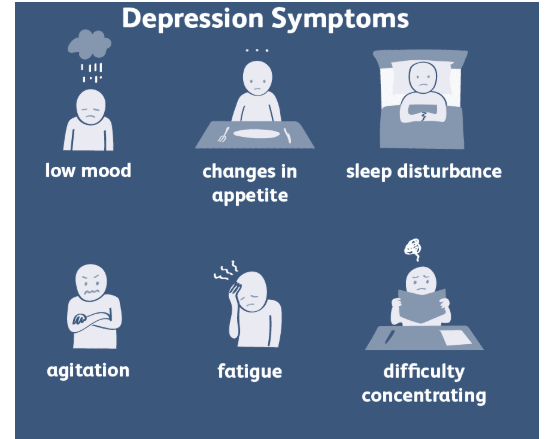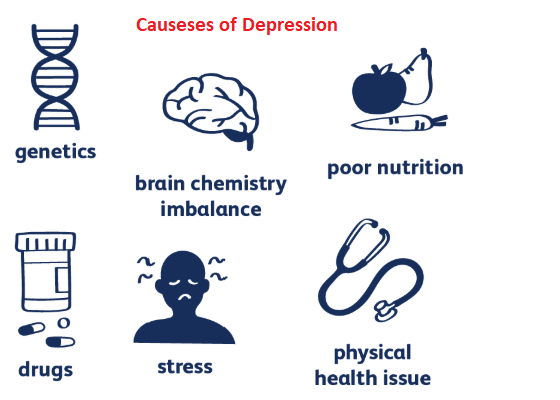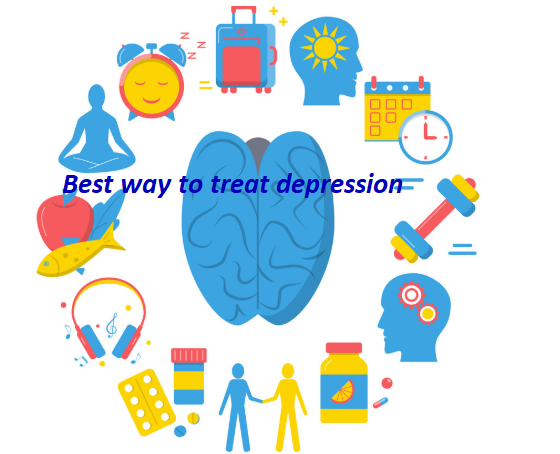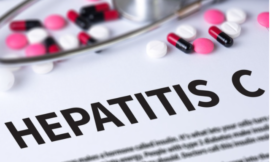Depression is classified as a mood disorder, that involves a persistent feeling of sadness and loss of interest. Studies shows that millions of peoples is suffering depression. We can say it is common or popular disorder and considered a serious medical condition that can get worse without proper treatment.
It is different from the mood fluctuations that people regularly experience as a part of life. If you having trouble sleeping, eating, and functioning continuously for at least 2 weeks, then you can depression. Check out the symptoms and causes of depression and get treatment at correct time.
Symptoms of Depression

Major depression can cause a variety of symptoms. Some affect your mood, and others affect your body. Symptoms may also be ongoing, or come and go.
The symptoms of depression can be experienced differently among men, women, and children differently.
In females
Depression is nearly twice as common among women as men.
Below are some symptoms of depression that tend to appear more often in females:
- mood, such as irritability
- emotional well-being, such as feeling sad or empty, anxious or hopeless
- behavior, such as loss of interest in activities, withdrawing from social engagements, thoughts of suicide
- cognitive abilities, such as thinking or talking more slowly
- sleep patterns, such as difficulty sleeping through the night, waking early, sleeping too much
- physical well-being, such as decreased energy, greater fatigue, changes in appetite, weight changes, aches, pain, headaches, increased cramps
In males
Men may experience symptoms related to their:
- mood, such as anger, aggressiveness, irritability, anxiousness, restlessness
- emotional well-being, such as feeling empty, sad, hopeless
- behavior, such as loss of interest, no longer finding pleasure in favorite activities, feeling tired easily, thoughts of suicide, drinking excessively, using drugs, engaging in high-risk activities
- sexual interest, such as reduced sexual desire, lack of sexual performance
- cognitive abilities, such as inability to concentrate, difficulty completing tasks, delayed responses during conversations
- sleep patterns, such as insomnia, restless sleep, excessive sleepiness, not sleeping through the night
- physical well-being, such as fatigue, pains, headache, digestive problems.
In children
In children, symptoms can make schoolwork and social activities challenging. They may experience symptoms such as:
- mood, such as irritability, anger, mood swings, crying
- emotional well-being, such as feelings of incompetence or despair, crying, intense sadness
- behavior, such as getting into trouble at school or refusing to go to school, avoiding friends or siblings, thoughts of death or suicide
- cognitive abilities, such as difficulty concentrating, decline in school performance, changes in grades
- sleep patterns, such as difficulty sleeping or sleeping too much
- physical well-being, such as loss of energy, digestive problems, changes in appetite, weight loss or gain.
Causes of Depression

The medical community does not fully understand the causes of depression. There are many possible causes, and sometimes, various factors combine to trigger symptoms. The causes range from biological to circumstantial.
- Genetic features – You’re at a higher risk for developing depression if you have a family history of depression or another mood disorder.
- Early childhood trauma – Some events affect the way your body reacts to fear and stressful situations.
- Changes in the brain’s structure – There’s a greater risk for depression if the frontal lobe of your brain.
- Drug use – A history of drug or alcohol misuse can affect your risk.
- Additional conditions, such as bipolar disorder.
- Poor Nutrition – lack of nutrients make you weak
In addition to these causes, other risk factors for depression include:
- low self-esteem or being self-critical
- personal history of mental illness
- certain medications
- stressful events, such as loss of a loved one, economic problems, or a divorce.
Types of depression
Depression can be broken into categories depending on the severity of symptoms. Some people experience mild and temporary episodes, while others experience severe and ongoing depressive episodes.
There are two main types;
Major depressive disorder
Major depressive disorder is the more severe form of depression. It’s characterized by persistent feelings of sadness, hopelessness, and worthlessness that don’t go away on their own.
In order to be diagnosed with clinical depression, you must experience 5 or more of the following symptoms over a 2-week period:
- feeling depressed most of the day
- loss of interest in most regular activities
- significant weight loss or gain
- sleeping a lot or not being able to sleeps
- slowed thinking or movement
- fatigue or low energy most days
- feelings of worthlessness or guilt
- loss of concentration or indecisiveness
- recurring thoughts of death or suicide
Persistent depressive disorder
persistent depressive disorder(PDD) is also called dysthymia. It’s a mild, but chronic, form of depression. PDD can affect your life more than major depression because it lasts for a longer period.
In order for the diagnosis to be made, the PDD symptoms must last for at least 2 years.
It’s common for people with PDD to:
- lose interest in normal daily activities
- feel hopeless
- lack productivity
- have low self-esteem
Depression can be treated successfully, but it’s important to stick to your treatment plan.
Treatment for depression
It is difficult to live with depression, but treatment can help improve your quality of life. Talk to your healthcare provider about possible options.
It’s common to combine medical treatments and lifestyle therapies, including the following:

Medications
Your healthcare provider may prescribe:
- Antidepressants
- antianxiety
- antipsychotic medications
Psychotherapy
Your therapist can help you learn skills to cope with negative feelings. You may also benefit from family or group therapy sessions.
Exercise
Exercising about 30 Minutes everyday makes you more energizing. Exercise can increase your body’s production of endorphins, which are hormones that improve your mood.
Light therapy
Light therapy is commonly used in seasonal effective disorder,which is now called depressive disorder seasonal pattern. Exposure to while light help to regulate your mood and improve symptoms of depression.
Take care of yourself
You can also improve symptoms of depression by taking care of yourself. This includes getting plenty of sleep, following healthy diet avoiding negative people, and participating in enjoyable activities.
Avoid alcohol and drugs
Avoid alcohol and drugs these thing are never going to help you rid of depression. But in the long run, these substances can make depression symptoms worse.
May be one treatment don’t help to complete rid from this disorder, so managing symptoms of depression involves finding the right combination of medications and therapies. Your health adviser help you create a different treatment plan that may work better in helping you manage your condition.





